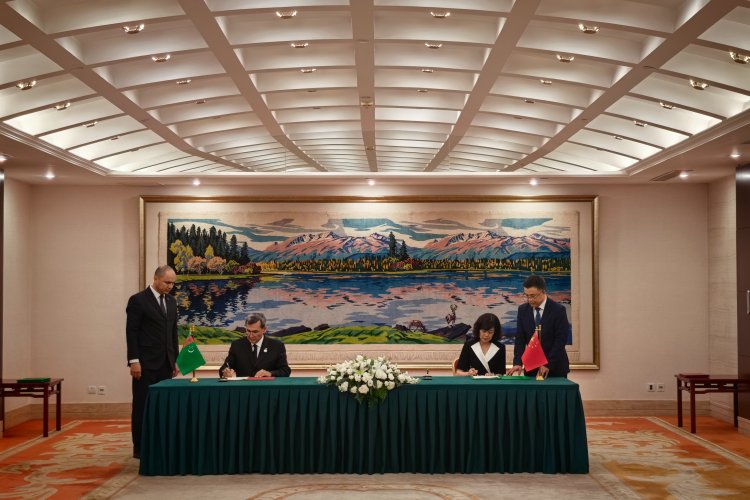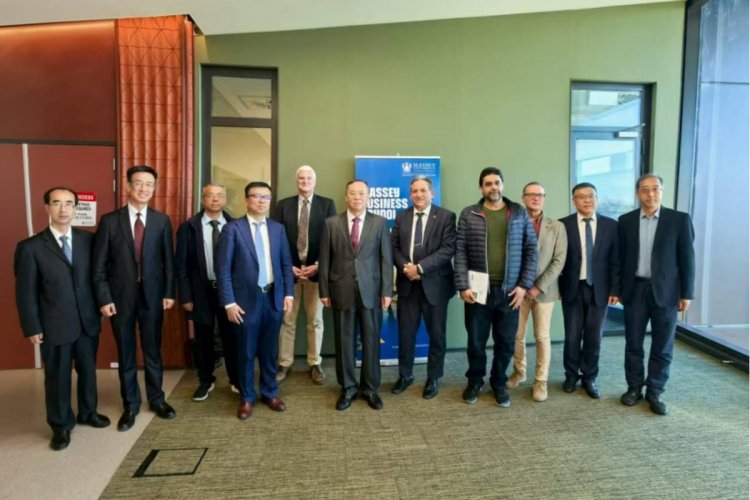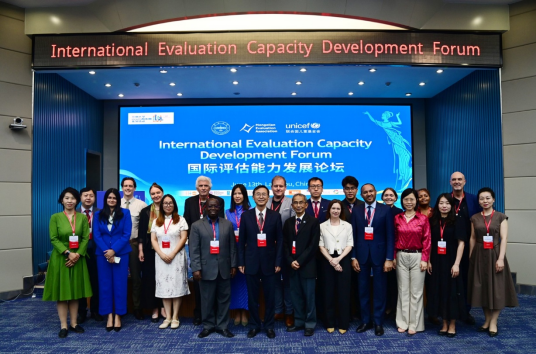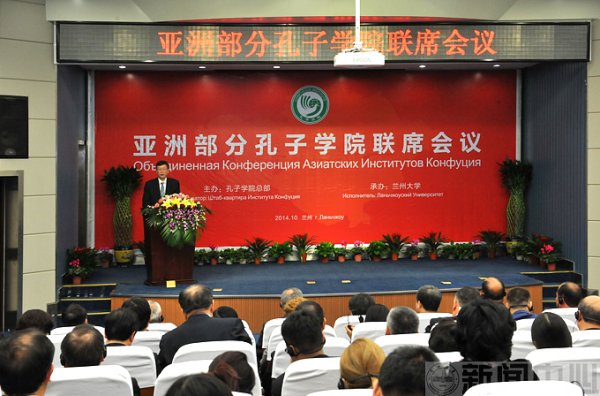
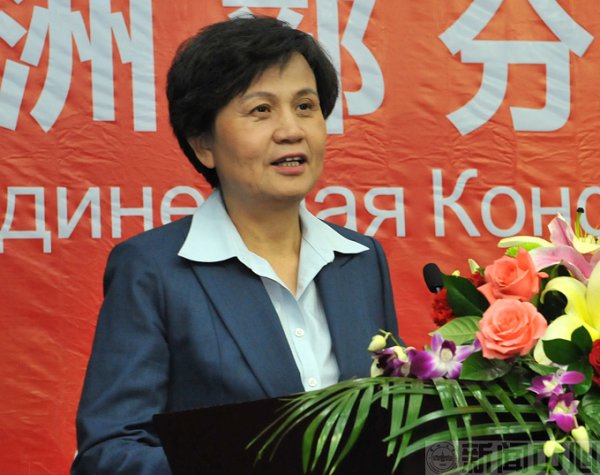

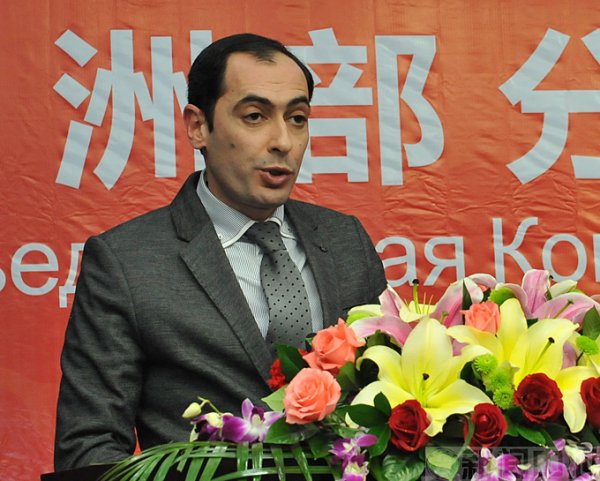
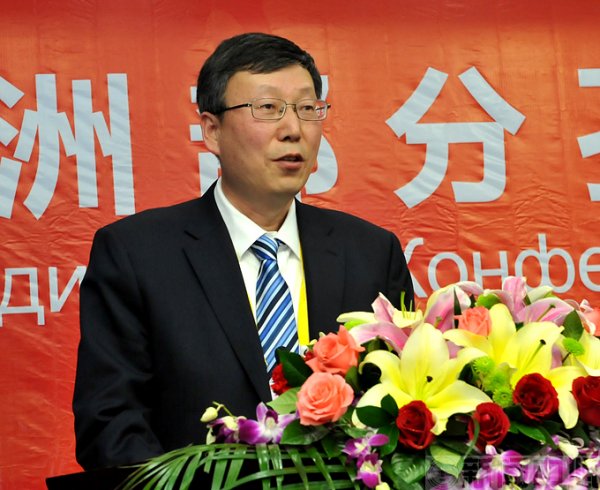
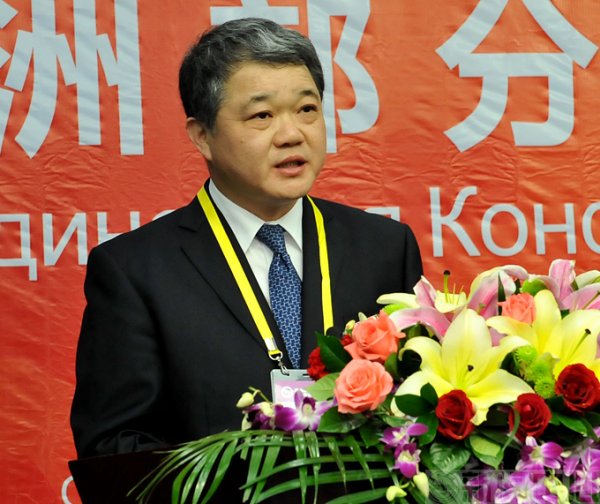
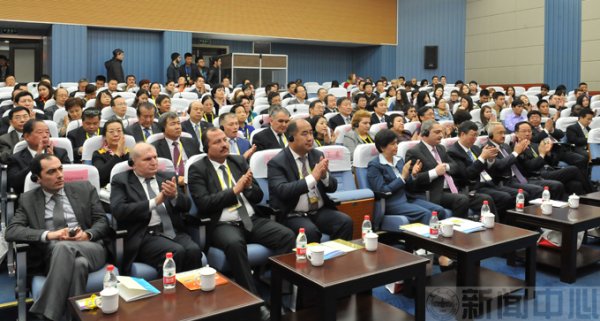

The opening ceremony of the Joint Meeting of Confucius Institutes in Asia was held at Lanzhou University on the afternoon of October 27th. Both foreign and Chinese presidents of seven Confucius Institutes from fourteen counties like Kazakhstan, Kyrgyzstan, Uzbekistan, Tajikistan, Georgia, Armenia and Azerbaijan, and leaders from Ten Chinese Universities attended the ceremony. Xu Lin, Secretary-General of the Confucius Institute Headquarters and Director of China National Office for Teaching Chinese as a Foreign Language (NOCFL), Armen Sargsyan, Armenian Ambassador in China, Mirzayev Matin, Azerbaijan counselor, Wang Jiayi, Director of the Education Department of Gansu Province, Wang Cheng, President of LZU and other guests were present at the opening ceremony. The opening ceremony was chaired by Wang Yongli, deputy Secretary-General of the Confucius Institute Headquarters and deputy Director of NOCFL.
Xu Lin stressed in the keynote speech that with joint efforts, the Confucius Institutes developed vibrantly in Central Asia and the outer Caucasus, enjoyed expanding schooling scale and increasing influence, and received warm welcome from local governments and peoples, serving an important platform for the local people to learn Chinese language and culture. In the context of constructing the "Silk Road Economic Belt" proposed by President Xi Jinping, Confucius Institutes have gone through rapid development in the regions along the Silk Road. Xu Lin put forward a strategy for the future development of the Confucius Institute: First, we should strengthen cooperation among enterprises and further increase the number of international students in China at public expense; Second, we should work harder to train local Chinese language teachers; Third, Xu hoped that Confucius Institutes of all countries and the Chinese institutions would develop the teaching materials projects, compiling nationally appropriate language textbooks; Fourth, we should select the public Chinese language teachers more carefully and continuously to improve the quality of teachers.
Armen Sargsyan noted that Armenia had paid more attention to the development of friendly and cooperative relations with China in recent years, and Confucius Institutes played an important role. In 2008, Yerevan State University established the first Confucius Institute to positively develop the cultural exchanges and cooperation between Armenia and China, promoting the Chinese language and culture and friendly relations between the two peoples.
Martin Mirza Aliyev stated that Azerbaijan attached great importance to education and would continue to increase the number of Confucius Institutes and improve their development, and the current president of Azerbaijan paid particular attention to developing friendly relations with China, and an Azerbaijan academician published many monographs on Chinese economy with the help of the Confucius Institute, systematically informing students of China's development.
Wang Jiayi stressed in his speech that Gansu Province serves the hub of the Silk Road, enjoying a very important position and irreplaceable advantages in the development of Chinese civilization. The Department of Education of Gansu Province should firmly grasp the historical opportunity to seriously implement strategies of regional cultural development, promote the construction of Confucius Institutes, and deepen international cooperation and exchanges in education. He also hoped that LZU would play the leading role in attracting more foreign students to study in Gansu.
Wang Cheng pointed out in his speech that LZU with a long history of more than one hundred years was located in Lan Zhou, hub of the Silk Road Economic Belt, and was one of the earliest Chinese colleges and universities in teaching Chinese language abroad and building Confucius Institutes. Early in 2001, the Ministry of Education appointed LZU as one of the ten key universities to support surrounding countries to teach the Chinese language, and LZU was responsible for helping five Central Asian countries in Chinese language teaching. Currently, LZU is working to establish the "Think Tank for the Economic and Cultural Development of the Silk Road Economic Belt", hoping that more scholars would be part of this cause.
The meeting is held by Secretary-General of the Confucius Institute Headquarters and deputy Director of NOCFL, co-sponsored by LZU, aiming that Confucius Institutes in Central Asia and the outer Caucasus regions would exchange experiences, reach consensus and work together to promote the sustainable development of the Confucius Institutes. The two-day meeting includes the opening ceremony, the session of experience exchange and symposia. Both Chinese and foreign presidents would exchange the experience of building Confucius Institutes, and representatives would carry out depth exchanges and discussions on three topics of local teacher training, local teaching materials development system, effectiveness of teachers dispatched by headquarters. During the meeting, experts in China would be invited to give lectures on "One Belt One Road".
(Translated by Li Yafeng; proofread by Sissi Xu)


